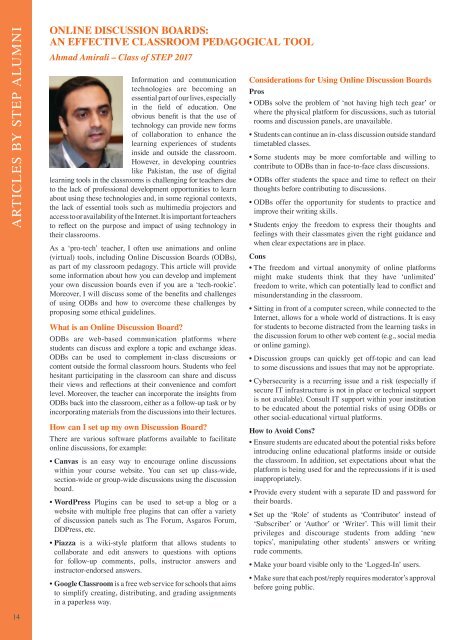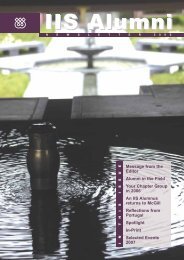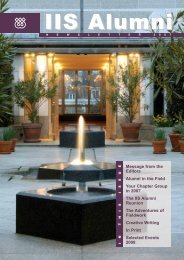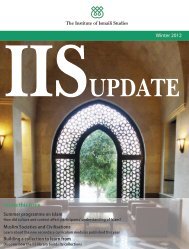You also want an ePaper? Increase the reach of your titles
YUMPU automatically turns print PDFs into web optimized ePapers that Google loves.
ARTICLES BY STEP ALUMNI<br />
ONLINE DISCUSSION BOARDS:<br />
AN EFFECTIVE CLASSROOM PEDAGOGICAL TOOL<br />
Ahmad Amirali – Class of STEP 2017<br />
Information and communication<br />
technologies are becoming an<br />
essential part of our lives, especially<br />
in the field of education. One<br />
obvious benefit is that the use of<br />
technology can provide new forms<br />
of collaboration to enhance the<br />
learning experiences of students<br />
inside and outside the classroom.<br />
However, in developing countries<br />
like Pakistan, the use of digital<br />
learning tools in the classrooms is challenging for teachers due<br />
to the lack of professional development opportunities to learn<br />
about using these technologies and, in some regional contexts,<br />
the lack of essential tools such as multimedia projectors and<br />
access to or availability of the Internet. It is important for teachers<br />
to reflect on the purpose and impact of using technology in<br />
their classrooms.<br />
As a ‘pro-tech’ teacher, I often use animations and online<br />
(virtual) tools, including Online Discussion Boards (ODBs),<br />
as part of my classroom pedagogy. This article will provide<br />
some information about how you can develop and implement<br />
your own discussion boards even if you are a ‘tech-rookie’.<br />
Moreover, I will discuss some of the benefits and challenges<br />
of using ODBs and how to overcome these challenges by<br />
proposing some ethical guidelines.<br />
What is an Online Discussion Board?<br />
ODBs are web-based communication platforms where<br />
students can discuss and explore a topic and exchange ideas.<br />
ODBs can be used to complement in-class discussions or<br />
content outside the formal classroom hours. Students who feel<br />
hesitant participating in the classroom can share and discuss<br />
their views and reflections at their convenience and comfort<br />
level. Moreover, the teacher can incorporate the insights from<br />
ODBs back into the classroom, either as a follow-up task or by<br />
incorporating materials from the discussions into their lectures.<br />
How can I set up my own Discussion Board?<br />
There are various software platforms available to facilitate<br />
online discussions, for example:<br />
• Canvas is an easy way to encourage online discussions<br />
within your course website. You can set up class-wide,<br />
section-wide or group-wide discussions using the discussion<br />
board.<br />
• WordPress Plugins can be used to set-up a blog or a<br />
website with multiple free plugins that can offer a variety<br />
of discussion panels such as The Forum, Asgaros Forum,<br />
DDPress, etc.<br />
• Piazza is a wiki-style platform that allows students to<br />
collaborate and edit answers to questions with options<br />
for follow-up comments, polls, instructor answers and<br />
instructor-endorsed answers.<br />
• Google Classroom is a free web service for schools that aims<br />
to simplify creating, distributing, and grading assignments<br />
in a paperless way.<br />
Considerations for Using Online Discussion Boards<br />
Pros<br />
• ODBs solve the problem of ‘not having high tech gear’ or<br />
where the physical platform for discussions, such as tutorial<br />
rooms and discussion panels, are unavailable.<br />
• Students can continue an in-class discussion outside standard<br />
timetabled classes.<br />
• Some students may be more comfortable and willing to<br />
contribute to ODBs than in face-to-face class discussions.<br />
• ODBs offer students the space and time to reflect on their<br />
thoughts before contributing to discussions.<br />
• ODBs offer the opportunity for students to practice and<br />
improve their writing skills.<br />
• Students enjoy the freedom to express their thoughts and<br />
feelings with their classmates given the right guidance and<br />
when clear expectations are in place.<br />
Cons<br />
• The freedom and virtual anonymity of online platforms<br />
might make students think that they have ‘unlimited’<br />
freedom to write, which can potentially lead to conflict and<br />
misunderstanding in the classroom.<br />
• Sitting in front of a computer screen, while connected to the<br />
Internet, allows for a whole world of distractions. It is easy<br />
for students to become distracted from the learning tasks in<br />
the discussion forum to other web content (e.g., social media<br />
or online gaming).<br />
• Discussion groups can quickly get off-topic and can lead<br />
to some discussions and issues that may not be appropriate.<br />
• Cybersecurity is a recurring issue and a risk (especially if<br />
secure IT infrastructure is not in place or technical support<br />
is not available). Consult IT support within your institution<br />
to be educated about the potential risks of using ODBs or<br />
other social-educational virtual platforms.<br />
How to Avoid Cons?<br />
• Ensure students are educated about the potential risks before<br />
introducing online educational platforms inside or outside<br />
the classroom. In addition, set expectations about what the<br />
platform is being used for and the reprecussions if it is used<br />
inappropriately.<br />
• Provide every student with a separate ID and password for<br />
their boards.<br />
• Set up the ‘Role’ of students as ‘Contributor’ instead of<br />
‘Subscriber’ or ‘Author’ or ‘Writer’. This will limit their<br />
privileges and discourage students from adding ‘new<br />
topics’, manipulating other students’ answers or writing<br />
rude comments.<br />
• Make your board visible only to the ‘Logged-In’ users.<br />
• Make sure that each post/reply requires moderator’s approval<br />
before going public.<br />
14

















